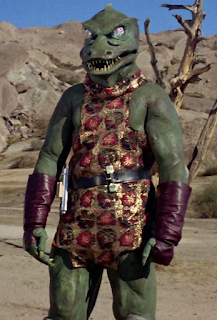Strange New Worlds is about the Enterprise's travels before the Original Series. If you try to pretend you're watching a continuous series starting with Strange New Worlds, though, inconsistencies start to show up. There's the strictly visual parts, of course, like the way the various locations inside the ship look, that everybody seems to have much roomier quarters now than later, the different uniforms, and stuff like that.
There are actual story issues too. Like, in "Amok Time," (original series) everyone is shocked that Spock is sort of married. Uhura and Chapel are both there, and they shouldn't be surprised at all. Chapel, especially, after "Spock Amok" (current series). Nobody seems to have heard of the Gorn in "Arena" (original series) and they show no recognition even when they see who Kirk is fighting. Lots of people talk about the Gorn throughout Strange New Worlds, though. You'd think someone might have said, "Hey, isn't that one of those guys who used to lay eggs in us all the time?"
I don't see these things as weaknesses, though, and I think I've figured out why.
Imagine telling stories as a sort of Plato's Cave scenario. Somewhere outside is the pure story, the story everyone is trying to tell. Neither the original episodes nor the prequel episodes are the pure story; they're just the closest their writers (and special effects people) are able to get to it. It's okay for minor inconsistencies to pop up as long as you're honestly trying to translate your part of the story, because it's impossible for any medium to convey the pure story; our stories are only shadows.
I've been percolating the idea of a pure story behind the story for a while, because, in a slightly different form, it was the idea behind the next novel I want to do and, to a lesser extent, The Nameless Way. (I'm still working on The Nameless Way. I've just organized some notes about the other one in a Scrivener file so I can write down ideas as I come up with them.)
Anyway, there was this space opera comic strip I did when I was eleven or so years old, just a grid on sheets of notebook paper. There's a considerable stack of those that I've somehow managed not to lose over the years. What I've been planning to do with those is study it like it's a bad translation of a great story, a transmission I was trying to relay, but couldn't get right.
Obviously, that's not what happened, but the conceit takes some of the pressure off. I don't have to make up the story; I just have to translate it.
That's the idea, anyway. I've gotta finish The Nameless Way before I can go start something else, and, at the speed I've been going, who knows if I'll ever pull that off.
Keep up with future posts by following me!

To begin... That is the BEST use of Plato's Cave that I have ever encountered.
ReplyDeleteI want canon to matter, but I have pretty much trained myself out of caring about it. In my case, the path was through Arthurian Romance, and I started out sideways, because my main introduction was "The Once and Future King", which isn't really the middle of that particular stream. Eventually I realized that there is not "there" there at all; it's just consensus and bullying and random numbers.
I still kind of believe that writers should try to respect their own canons; I forgave Lucas for rewriting the universe between "Hope" and "Empire", with some difficulty... but that definitely set up the loss of respect I experienced when "Jedi" came out.
These days... It's a rare work that can generate enough passion in me to even notice errors in canon, much less care about them.
But I like the idea of "Pure Story". It's parallel to the old saw about removing everything from the stone block that isn't the final sculpture.
Anecdote One: I horrified another Tolkien fan, back in 2000, when I said that they had correct one of Tolkien's mistakes by giving Glorfindel's screen time to Arwen. He claimed that Tolkien was truth, period. It didn't matter that he hadn't given Arwen enough visibility, and that she came completely out of left field for first-time readers. (I literally said, back in the long ago, "Who the hell is this? The producer's niece?")
Anecdote Two: I definitely feel the pull of pure story when I am writing. There was a story I finished last year that just would not come together, for months, until I shifted one detail from charater A to character B, and then the story jumped off the page. Magic.
I do agree that we should try to be consistent within our own stories. I was thinking more of giant corporate creations like Star Trek and Marvel with "established canon" dished out by whatever functionary is manning the social media feed that day.
DeleteAnd yeah, Tolkien should have made Arwen an actual character instead of a prop. Jackson should have made Arwen an actual actor instead of Liv Tyler, too.